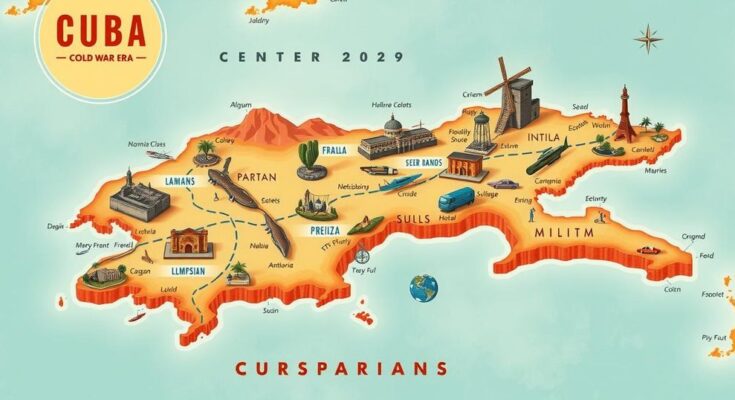This article reviews Cuba’s geopolitical dynamics during the Cold War, focusing on Fidel Castro’s perspectives on sovereignty, Marxism, and foreign alliances. It explores Cuba’s unique positioning amidst pressures from both superpowers, the USSR and the U.S., and highlights key moments where Cuba asserted its independent foreign policy and strategies to engage with liberation movements worldwide, especially in Africa.
The Cold War period significantly defined Cuban geopolitics, particularly as articulated by Fidel Castro during his address to Polish Communist leaders. Castro emphasized the stark differences in security perceptions between Europe and the Caribbean, noting that Cubans lacked protection from military alliances. His discussions underscored the impact of the Vietnam War on Cuba’s geopolitical stance, stating that geographic factors shaped the application of Marxism-Leninism principles in Cuba and Vietnam’s contexts.
Cuba’s place within the socialist camp was complex, maintaining ties with the CMEA while articulating fundamental differences. Castro’s earlier stance on the Soviet intervention in Czechoslovakia illustrated this complexity, recognizing the geopolitical maneuvering of the USSR while critiquing its legality. Cuba’s nuanced response distinguished between legal and geopolitical motivations, asserting that, if there had been ideological consistency, Soviet troops would have also intervened in defense of Cuba and Vietnam.
Despite criticisms suggesting Cuba conformed to Soviet directives in the late 1960s, Castro’s speeches in 1972 revealed a more proactive and independent Cuban foreign policy, aimed at countering U.S. isolation and fostering alliances across various ideologies in the Tricontinental and Non-Aligned Movements. These alliances sought a cooperative space among diverse political movements, rather than to export revolution as perceived by Washington.
Cuban leadership faced friction not only with the U.S. but also with the policies of the USSR and China, which sometimes fostered division within the socialist camp. Cuba condemned China for its actions, particularly during the Vietnam invasion and supporting oppressive regimes in Latin America. This tension further complicated Cuba’s relationship with the USSR, especially during the Soviet invasion of Afghanistan, which ignited public diplomacy challenges and illustrated Castro’s critical stance despite outwardly supporting Moscow.
Cuba’s geopolitical engagement in Africa contrasted with its ties to Eastern Europe, where it sought balance through military and diplomatic initiatives in support of liberation movements. Cuban military actions across Africa and cooperation with newly independent nations demonstrated its strategic engagement in global geopolitics, often aligning with the USSR while simultaneously navigating tensions with China.
As the Cold War progressed into the final stages of the USSR’s perestroika, Castro continued to advocate for a socialist approach respecting sovereignty and the self-determination of nations. His assertion that socialist countries should be allowed to pursue their chosen paths without external interference reflects a principle central to Marxism-Leninism, demonstrating a complex understanding of geopolitical realities during a transformative historical moment.
In retrospect, the lessons drawn from Cuban geopolitics during the Cold War underscore the importance of maintaining a broader perspective in current geopolitical discourse. As new and old powers vie for influence, understanding these strategic dynamics and maintaining principles over narrow ideological confines are essential in navigating an evolving geopolitical landscape.
In summary, the exploration of Cuban geopolitics during the Cold War reveals a strategic approach shaped by the complex interplay of local and global dynamics. Castro’s advocacy for national sovereignty within Marxist principles highlighted Cuba’s independent stance despite external pressures from superpowers. The relationships established during this period not only illustrate the resilience of Cuban diplomacy but also provide valuable insights for contemporary geopolitical challenges, reinforcing the need for cooperation beyond mere ideological alignments.
Original Source: oncubanews.com




